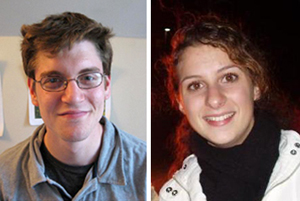Beckman Scholarships Give Undergrads a Big Boost
Science students get funds for two years of research

It didn’t take much to get Florencia Rago hooked on research: just a two-week high school internship in a lab studying heart cells at the University of Connecticut Health Center. By the end of her freshman year at Boston University, Rago (CAS’10) was working with Dean Tolan, a College of Arts and Sciences professor of biology, whose lab studies the enzymes involved in metabolism. She is already working on her own investigation of an enzyme responsible for breaking down fructose, research that could one day inform the understanding of the metabolic disorder hereditary fructose intolerance.
Last week, Rago’s commitment to research was given a big boost when she was named one of the University’s two 2008 Beckman Scholars, an award of $19,300 each in research support from the Arnold and Mabel Beckman Foundation. The other 2008 Beckman Scholar is Tyler Ford (CAS’10), who will be studying the molecular basis of lymphoma in the lab of Thomas Gilmore, a CAS professor of biology and director of BU’s Undergraduate Research Opportunities Program (UROP), which administers the Beckman scholarships. UROP has since 1997 promoted participation by BU undergrads in faculty-mentored research University-wide. Both Rago and Ford are majoring in biochemistry and molecular biology.
The foundation provides each Beckman Scholar with stipends for one academic year and two full summers of research. UROP supplements the award with $4,000 grants for a second year of research funding. The award also includes a trip to a symposium in California, where the Beckman Scholars present their capstone projects of independent research.
This kind of research support is a huge advantage for an undergraduate, according to Gilmore. “It winds up being a great boost to their career,” he says. “A lot of people in science are aware of this award, and the research symposium in California is a great networking opportunity.”
An internal Beckman Scholars Committee comprising BU science faculty and one former Beckman Scholar chose Rago and Ford to receive the awards. But the Beckman Foundation first had to choose BU. Every year, the foundation grants three years of funding to universities on a competitive basis, and this year BU was one of 15 institutional award recipients, out of about 150 asked to apply. Gilmore, who wrote the grant application, says that means he and the Beckman Scholars Committee will select two new Beckman Scholars in 2009 and two more in 2010.
This is the fourth time BU has been awarded the multiyear Beckman Scholars grant since the foundation began sponsoring the undergraduate research scholarships in 1997 with the goal of advancing the education, research training, and personal development of select students in chemistry, biochemistry, and the biological and medical sciences. Previous BU Beckman Scholars have gone on to top graduate and medical schools and research centers, such as the Broad Institute, a joint Harvard and MIT genomics lab.
“We have a good track record with the Beckman Foundation,” says Gilmore. “That helped us tremendously.”
To apply for a Beckman Scholarship, BU students must be sophomores majoring in biology, biochemistry and molecular biology, chemistry, or biomedical engineering and have at least a 3.4 grade point average. Applicants interview with 3 professors — from among the 15 faculty members who are “Beckman Faculty Mentors” — in whose labs they would like to work. Later, they also interview with the internal Beckman Scholars Committee.
While Rago was already engaged in her own research, Gilmore says, most Beckman Scholars work their way up to that by the end of their first year of funding. “Usually, students don’t come in as a sophomore and say, ‘I’m going to cure cancer,’” he says. “Generally, they’re put with a grad student or a postdoc fellow, because there’s some training and intellectual grooming involved.”
But two years of intensive lab work makes a big impact, he says. “Almost all of these students wind up named on research publications in journals,” he says. “By the time they leave, they’re pretty much functioning at the level of a grad student.”
Chris Berdik can be reached at cberdik@bu.edu.
Comments & Discussion
Boston University moderates comments to facilitate an informed, substantive, civil conversation. Abusive, profane, self-promotional, misleading, incoherent or off-topic comments will be rejected. Moderators are staffed during regular business hours (EST) and can only accept comments written in English. Statistics or facts must include a citation or a link to the citation.